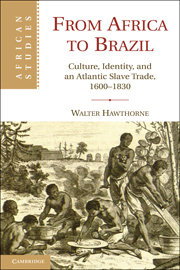Book contents
- Frontmatter
- Contents
- List of Figures
- List of Maps
- List of Tables
- Abbreviations Used in Notes
- Acknowledgments
- Introduction
- PART I THE WHY AND HOW OF ENSLAVEMENT AND TRANSPORTATION
- 1 From Indian to African Slaves
- 2 Slave Production
- 3 From Upper Guinea to Amazonia
- PART II CULTURAL CHANGE AND CONTINUITY
- Index
- References
1 - From Indian to African Slaves
Published online by Cambridge University Press: 05 September 2012
- Frontmatter
- Contents
- List of Figures
- List of Maps
- List of Tables
- Abbreviations Used in Notes
- Acknowledgments
- Introduction
- PART I THE WHY AND HOW OF ENSLAVEMENT AND TRANSPORTATION
- 1 From Indian to African Slaves
- 2 Slave Production
- 3 From Upper Guinea to Amazonia
- PART II CULTURAL CHANGE AND CONTINUITY
- Index
- References
Summary
In 1767, Judge Antonio Jozé Araújo of the captaincy of Maranhão in Brazil’s Amazonia region visited the home of Ventura de Almeida in Vila de Viana to conduct an inventory of the deceased’s possessions. Along with a variety of personal items, some land, cattle, and fields of cotton and rice, he owned eleven slaves. All of Almeida’s slaves had been given Christian names, only one maintaining an African surname. Diogo was a Mandinka male who was about thirty years old and married to Rita, a twenty-five-year-old cafuza, or racially mixed woman of black and Indian descent. The thirty-five-year-old Manoel Beyam was listed as a Guiné, or a person from the Upper Guinea region of Africa. His last name, which is not Portuguese, indicates that he, like Diogo, was of Mandinka origin. Eugenca, Beyam’s twenty-three-year-old wife, was also from Guiné, of an ethnic group unnamed. Francisco, a Biafada who was forty years old, was in good health like most of his fellow slaves. However, Vicente, a Papel who was thirty, was either sick or injured, as he was valued at only 50,000 réis, which was a little less than half the value of those who labored beside him for Almeida. Francisco and Vicente likely shared some of the same memories of the Upper Guinea coast’s Grande and Geba Rivers, on which people from their two ethnic groups lived, farmed, and traded. At eighteen, Anna was the youngest of the Upper Guinea–born slaves. Three slaves, Jozefa (age eighteen), Bendito (thirty-five), and Agostinho (twelve), were all listed as crioulo, meaning that they were blacks who had been born in Brazil. Antonio, who was thirty-five, was simply listed as negro, or black, giving us no hint as to where he might have been born.
Had Almeida’s inventory been generated in 1747 instead of 1767, it would have been an odd document indeed. In the 1740s, both the African and crioulo populations of Amazonia were miniscule. At that time, the backbone of the landholders’ labor force was made up primarily of Indians. However, to Almeida’s contemporaries in Maranhão as well as in Pará, the other Amazonian captaincy, there would have been nothing unusual about any of Almeida’s possessions. In the 1760s, most Amazonian colonists grew cotton and rice. Most owned relatively few things, the region being undeveloped compared to the rest of Brazil. And many held African slaves, the majority of whom were from Upper Guinea. Over a short period of time, a revolution had taken place in Maranhão, as Upper Guineans replaced Indians in the fields.
- Type
- Chapter
- Information
- From Africa to BrazilCulture, Identity, and an Atlantic Slave Trade, 1600–1830, pp. 25 - 60Publisher: Cambridge University PressPrint publication year: 2010

